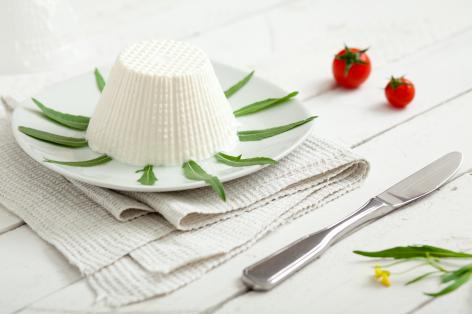
Ricotta curd cheese could be recommended for people who value milk and milk protein products, and especially healthy eating. The most remarkable thing about ricotta products is milk protein and its high content – up to 20% – up to 95% of which is composed of whey proteins with high biological value that are easily taken in by the human body. Since the bulk of the carbohydrates (mostly lactose) in the milk used for cheese making remains in the raw ricotta, natural ricotta contains a lot of carbohydrates (4-7%) Ricotta contains moderate amounts of calories – one hundred grams of ricotta provides about 100-150 kilocalories of food energy. The sufficient amount of calcium in ricotta must also be mentioned. Both the whey (since the bulk of the calcium in the milk used for cheese making remains in the whey) and the calcium salts added while making the ricotta are responsible for its high calcium content.
10 PROS OF RICOTTA
- Ricotta has a mild and subtle caramel taste.
- Ricotta has lower acidity than standard curd.
- Ricotta is a protein-rich cow milk product, which has a high nutritional value due to its high whey protein, i.e. serum albumin content.
- Serum albumin composes 90% of ricotta’s overall protein content.
- Serum proteins are taken in much better by the human body than milk protein (i.e. casein), which is why ricotta is the perfect source of protein for people who are physically active and an irreplaceable source of protein to speed up sportsmen’s recovery time.
- Ricotta is extremely rich in calcium – 100g of the product contain 20-25% of an adult’s daily calcium requirement.
- The balanced butterfat content in ricotta supports calcium absorption – namely, butterfat is irreplaceable in helping the human metabolism to absorb calcium.
- In addition to the daily curd consumer, ricotta is also especially suitable for those who are intolerant of the high acidity of curd.
- No preservatives have been added to ricotta in the course of production.
- Due to its neutral taste and relatively low acidity, ricotta is widely used in making various modern salty and sweet dishes as well as pastries.
The texts have been compiled in cooperation with PhD Margus Friedenthal and magazine Oma Maitse!





